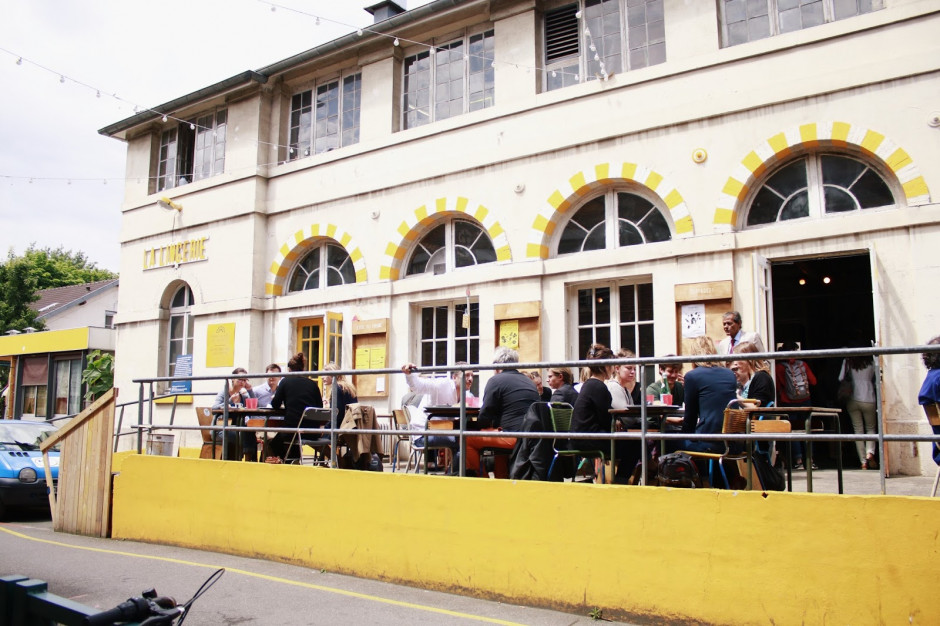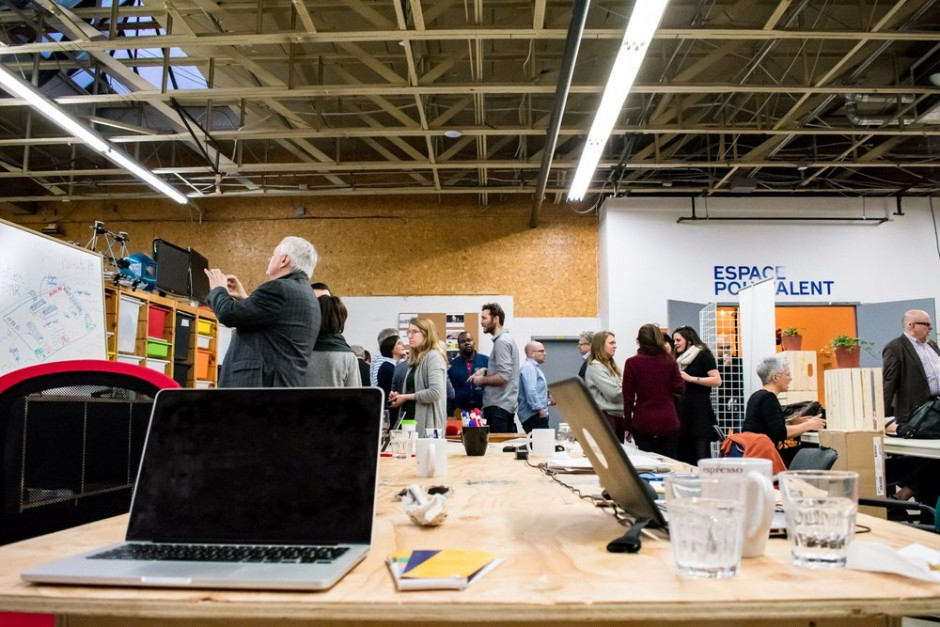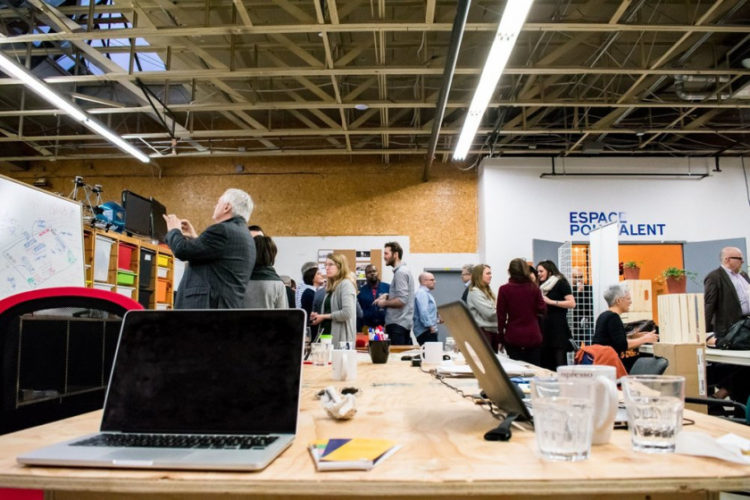Second step of the Wide Open Project, a world tour of positive innovation ecosystems: transitional urbanism in Montreal.
This month, our two explorers set sail for Montreal and are now making a stopover at Project Young, a pioneering site for the temporary occupation of a municipal industrial building in the city of Montreal. The opportunity for the Wide Open team to address the issue of transitional urbanism, a new sustainable practice between preservation of heritage and inclusion of vulnerable communities.
BEYOND TEMPORARY OCCUPANCY, TRANSITIONAL URBANISM
For owners, public or private, leaving vacant buildings involves a considerable cost: maintenance costs, opportunity costs, degradation of the image; risk of decay… One of the solutions – appeared in the 70s – to cover these costs, is to make available the temporarily vacant space, for the implementation of ephemeral projects. This is called temporary occupation. Transient urbanism implies an additional dimension: the project temporarily hosted, prepares and prefigures the sustainable development project that will succeed it. It’s about connecting the past, current and future uses of the place. Valuing buildings, particularly heritage, transitional urbanism also foreshadows the sustainable urban project that will succeed the temporary experience.
FROM PARIS TO MONTREAL, ZOOM ON THE FIRST STEPS OF AN INCLUSIVE TRANSITIONAL URBANISM
These emerging practices are made possible through the collaboration of public actors, owners and intermediaries, orchestrating transitional projects with communities. This is the opportunity to benefit from low-cost spaces to structures that can not afford to rent differently and create positive ephemeral ecosystems. Transient urbanism rhymes with inclusion, equal opportunities and sustainable innovation. Les Grands Voisins and Projet Young, respectively in Paris and Montreal, are two pioneering projects particularly in terms of inclusive transitional urbanism. In the world of real estate 2.0, the approaches of these transatlantic ecosystems are distinguished by their inclusive approach, offering the opportunity to local communities to benefit from spaces they could not afford otherwise. Although these projects, though born in distinct legal, political and legal contexts, both show that inclusive transient urban planning is as possible as necessary.
GREAT NEIGHBORS
In 2012, the announcement is made: the site of the hospital Saint-Vincent-de-Paul in the 14th district of Paris, then being acquired by the City of Paris, will be transformed into a new district, with the creation of 600 dwellings. The work of the urban project is not planned until 2018, the period of vacancy of the heritage site gives the opportunity of a pilot project of a fixed duration: the Great Neighbors. The site is initially entrusted to the association Aurore, specialized in emergency housing and the reception of vulnerable people. In 2015, the Plateau Urbain association supports Aurore in coordinating the occupancy of the premises and supports the structures housed in their installation projects. The team of Yes We Camp, meanwhile, ensures a fruitful collective dynamic between all residents of the site, and ensures the challenge of opening to the public. Today, at the dawn of the beginning of the work, nearly 2000 people live and work in the former disused hospital. Between the accommodation of frail people and the occupation of the remaining premises by associative, cultural and supportive projects, the great diversity of its publics, made the Grand Voisins a large-scale urban laboratory, a field of experimentation of new uses, urban, social, environmental. In addition to energizing a neighborhood that otherwise would have been lifeless for several years and providing support to the most vulnerable populations, the ephemeral site, open to all, was a wonderful observatory of the needs and dreams of local communities, brought to imagine their eco-neighborhood of tomorrow.

THE YOUNG PROJECT
The Young project, launched by the Entremise association, is the first transient urban development project in the city of Montreal. This pilot project is the result of an unprecedented collaboration between the association Entremise, the House of Social Innovation, the McConnell Foundation and the City of Montreal. The temporary occupation of a vacant municipal industrial building at 204 Young Street, in the Griffintown neighborhood, brings together in one space, for a period of 22 months, the studios of MIS, House of Social Innovation, the Ville d’Avenir program, as well as some 20 cultural and community organizations, artists and social entrepreneurs. The project allows structures that could not afford to rent spaces otherwise, to access a central space where to develop their business, with only financial contribution the price of the charges. In exchange, everyone agrees to contribute to the collective dynamic of the place.Not only to increase the equality of opportunity for those carefully selected project promoters for their investment in neighborhood dynamics, the project is also an opportunity to adapt the design approach of future social housing, at most close to the needs expressed by local communities. At the value of use of the building, the association Entremise adds a social value: the time of vacancy of the site is an opportunity to take the pulse of the local communities, to let them reclaim the site and make it community, thus offering a very strong local anchorage to the urban project in the making.

TEMPORARY SITES FOR CITIES IN TRANSITION
Beyond reducing the risks posed by vacant buildings, transient urban planning allows the municipality to test and prototype permanent solutions for its territory, and to transform even its own construction processes in the city, through more agile actors. This is understood by the city of Montreal, which took the gamble to provide one of its vacant industrial buildings for the Young pilot project. Having found the courage and the political will to move forward without having all the answers, the municipality is now determined to facilitate more pilot projects in the coming years, and has embarked on 10 similar projects in order to a scaling up of transient urbanism in Montreal.These “Proof of Concept” projects in the field of temporary occupation, brilliantly illustrate the performance of multi-stakeholder alliances – private, public, and associative – in solving urban issues. These positive ecosystems also offer collective grounds to experiment and work for new sustainable uses and solutions in the territories. Opening a wide range of possibilities, this movement offers positive alternatives to the service of a healthy democracy and greater resilience of cities.
The project young : http://www.entremise.ca/laboratoiretrans
The association Entremise : http://www.entremise.ca/
The house of social innovation : https://www.mis.quebec/
The Great Neighbors: https://lesgrandsvoisins.org/
Plateau urbain : https://www.plateau-urbain.com/

